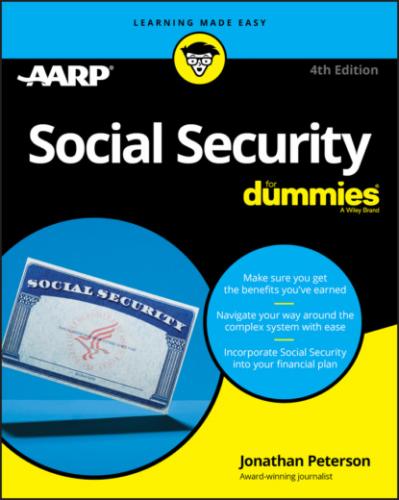257 260
258 261
259 262
260 263
261 265
262 266
263 267
264 268
265 269
266 270
267 271
268 272
269 273
270 274
271 275
272 276
273 277
274 278
275 279
276 280
277 281
278 282
279 283
280 284
281 285
282 286
283 287
284 288
285 289
286 290
287 291
288 292
289 293
290 294
291 295
292 297
293 298
294 299
295 301
296 302
297 303
298 304
299 305
300 306
301 307
302 308
303 309
304 310
305 311
306 312
307 313
308 314
309 315
310 316
311 317
312 319
313 320
314 321
315 322
316 323
Introduction
You’re reading this book, so you’re probably thinking about the future — for yourself or for your loved ones. You probably want to know more about the Social Security benefits that could go to you and your family one day and how that money will meet your needs. You may also be thinking about the next phase of your life. Will it be financially comfortable? Will it be a struggle? If you’re like many people, you wonder whether you’re going to outlive your savings. Will Social Security keep you afloat? Can you count on your Social Security benefits? What should you know about the program? How can you find the information you need?
Despite its significance in modern life, Social Security is rarely explained clearly in one place. Not in a way that lays out the program and explains how you fit in, all the protections Social Security offers, and what they mean for you and your loved ones. Not in a way that empowers you to plan right and face the bureaucracy with your eyes open. Not in a way that tells you what you need to know about the rules that affect benefit amounts and eligibility. But understanding this stuff is important — for you and for those who depend on you.
That’s why I wrote this book: to explain the important protections of Social Security in a way that makes sense to the people who earn them and pay for them. (That means you!)
Social Security is big, and it can be confusing. It has an endless assortment of rules, variations on the rules, exceptions to the rules, and exceptions to the exceptions to the rules. The fine print is a big deal. Decisions you make about retirement benefits can have a financial impact for many years, in ways you may not recognize today. Certain areas, such as disability, are especially complicated. No wonder you may be uncertain. It’s not like they teach you this stuff in school.
Everybody has questions about Social Security — questions like these:
What’s the best age for me to start claiming benefits?
Can I work and also collect Social Security?
How does my divorce affect my eligibility for benefits?
Will it help my spouse if I wait until 70 to start collecting Social Security?
Is the retirement age changing?
What’s the best way to contact Social Security?
What kind of benefits can go to a spouse or child?
Can I solve my problem online?
What should I bring with me when I apply for benefits?
Will Social Security be there when I need it?
You deserve helpful answers to these important questions and many others — answers that are clear and accurate. After all, Social Security is your program. You own it through the taxes you pay and the benefits you earn. You should know how your personal finances and your work history affect the benefits that land in your bank account. You should know what to expect from the bureaucracy and how to deal with it effectively. And you can find the answers in these pages.
About This Book
Social Security For Dummies walks you through the basics of this critical program: what Social Security is, how you qualify, when to file, how much you’ll get, how much goes to your dependents, and how to contact the Social Security Administration (SSA) to get the information you need. And it does all this in easy-to-understand plain English.
Above all, this book is a reference, which means that you don’t have to read it from beginning to end, nor do you have to read every word, every chapter, or every part. Keep this book on your desk or kitchen counter and pull it out when you need an answer to a specific question. Feel free to skip anything marked with the Technical Stuff icon and anything in a shaded box (called a sidebar); that information is interesting but not essential to understanding Social Security.
This edition makes use of the latest statistics available at the time of writing in 2020 and includes updated information on claiming strategies for married couples, as well as Social Security policy on same-sex marriages and details on personal “my Social Security” accounts.
Within this book, you may note that some web addresses break across two lines of text. If you’re reading this book in print and want to visit one of these web pages, simply key in the web address exactly as it’s noted in the text, pretending as though the line break doesn’t exist. If you’re reading this as an e-book, you’ve got it easy — just click the web address to be taken directly to the web page.
Foolish
